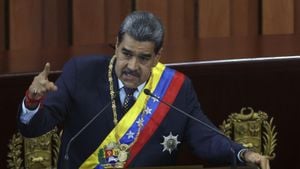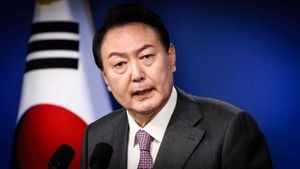On February 21, 2025, the world marked International Mother Language Day, celebrating the significance of linguistic diversity and the value of preserving mother tongues across the globe. This day serves as both a reminder and a celebration of the inherent cultural richness languages contribute to communities.
This year, UN-related initiatives took center stage. One of the key activities took place at the UN office in Jakarta, Indonesia, where events highlighted various languages spoken within the region. Medina Basaib from UNIC emphasized the importance of recognizing and embracing different linguistic backgrounds. She stated, "Language is more than just a means of communication; it is a bridge to community, connection, and opportunity," underscoring the day’s purpose.
The theme of this year's observance aligns well with the UNHCR's efforts across Central Asia. On this day, the agency introduced the "UNHCR Central Asia Key Terms guide" featuring translations not only in English and Russian but also six Central Asian languages: Kazakh, Kyrgyz, Tajik, Turkmen, and Uzbek. This move aims to support communication surrounding refugee and statelessness issues effectively, fostering greater integration within local host communities.
UNHCR is committed to enhancing language skills among refugees, offering free language classes in collaboration with community partners, which include Kazakhstan's Red Crescent Society and the American University of Central Asia. Such programs help to strengthen familial ties, making it easier for refugees to access services, forge connections, and contribute to the welfare of their new homes.
Language as identity is also at the heart of this day’s celebrations. It’s about more than just communication. It embodies cultural heritage and personal identity. Countries around the world recognize the challenges associated with losing native languages, which the DW report suggests occur at alarming rates. "Every two weeks, another mother tongue falls silent," the report warns, highlighting the urgency of preserving these languages.
International Mother Language Day is rooted deeply in historical events, particularly the protests for Bengali language rights which were marred by violence in 1952. This date is remembered not only for its commemorative aspects but also as a poignant reminder of the sacrifices made for linguistic rights. It was formally recognized by UNESCO after Bangladesh’s proposal, leading to global acknowledgment of the need to promote and preserve diverse languages.
Today, many countries host celebrations filled with cultural activities, educational programs, and community gatherings aimed at recognizing linguistic diversity. For example, on February 21, Croatia kicked off its Month of the Croatian Language, celebrating achievements and sharing interesting facts about the language, including its historical roots dating back to the 13th century. This initiative also stems from the 1967 Declaration on the Name and Status of the Croatian Literary Language.
Looking at how languages evolve, the global linguistic framework is transforming rapidly. Aria Adli, a language researcher, explains, "A language dies out when the number of people who speak it is too small," bringing attention to endangered languages across Europe and beyond. Though the German language remains relatively secure, many minority languages are at risk. Multilingualism is increasingly recognized as both valuable and enriching. For many communities, it allows for enhanced cultural expression and communication.
The recognition of International Mother Language Day sheds light on the necessity for every individual to advocate for their mother tongue. Ensuring these languages thrive is not only about preserving words; it’s about protecting the identities and histories they carry. With each language representing unique perspectives, customs, and traditions, the world’s linguistic diversity is truly a treasure worth celebrating.
On this significant day, as individuals across nations celebrate their languages and cultures, let it serve as a call to action. Linguists, educators, and community members are urged to continue safeguarding their rich linguistic heritages. Language is the very essence of community and collective identity, and as we move forward, it is imperative we honor and preserve these invaluable assets for future generations.



